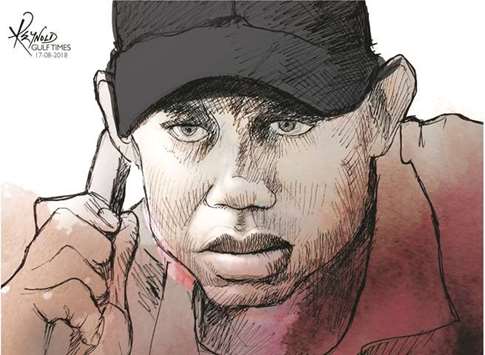There will not be a more fantastical sport plotline in our lives than Tiger Woods’s Thanksgiving in 2009, when the incandescent career and immaculate public image of the world’s most dominant and influential athlete came spectacularly undone in the dead of a Florida night.
The sordid details of the episode have been exhaustively documented and need not be recounted here. Suffice it to say the 14-times major winner never did regain the unassailable form that made him the first billion-dollar sportsman.
A brief flicker of hope a half-decade ago, when he won five tournaments and managed to regain the world No 1 ranking, appeared in time to represent the final sparks spitting from a burnt-out log on a fire before it goes out completely.
Woods entered a scant nine of the 19 major championships staged from the 2013 US PGA Championship to the 2018 US Open, missing the cut five times and never finishing better than tied for 17th.
Concerns over his personal life, dormant for years as he settled back into a quiet normalcy, resurfaced last year when he was charged with driving under the influence after he was found asleep in his Mercedes-Benz, apparently after taking a prescription painkiller and sleeping medication.
A few months later, he admitted he may never play competitively again. Even though he looked the same on the outside, the engine on the chassis was broken. It was time to shut it down. A decade before it would have been difficult to imagine ever feeling pity for Woods, but as recently as last month it had become difficult to not feel sorry for him.
Yet we all kept watching despite the gnawing suspicion he was finished, and the end would not be pleasant.
Woods, a veteran of four major back surgeries in recent years, had become the Mike Tyson of golf, a prodigy and uniquely American success story who arrested the imagination of the public so entirely that it was left in a state of denial over his downfall.
Then came last month’s Open at Carnoustie, where Woods made his first legitimate run at a major title in years, finishing in a tie for sixth. That proved only a prelude to last week’s US PGA Championship at Bellerive, where he loomed in contention for three days before delivering a round for the ages on Sunday afternoon.
He managed to finish three under despite hitting one fairway on the front nine, then birdied the 18th for a six-under 64 – his lowest score in the final round of a major – and finished two strokes behind Brooks Koepka in second place but first in the hearts of the St Louis masses.
To behold Woods even contending for a major, validating the collective hope that for so long had flown in the face of our better senses, is a remarkable tale enough
If he did somehow win one of the four bedrock events – he will be 43 when he gets a crack at next year’s Masters – it would be one of the greatest stories in the history of sport, if only because for so much of the past decade it would have seemed almost impossible.
The legacy of a great athlete often reaches its zenith well after his or her actual prime – a phenomenon uniquely measurable in boxing, where top fighters often collect their highest purses when their best days are behind them.
The shrewd business is the public paying not for the product at hand but a memory – a feeling. The mania that surrounded Tiger throughout Sunday, quantifiable by the teeming masses that followed him and cheered his every success, and the TV ratings that suggest a mainstream crossover that had been lacking for most of the past decade, evoked a time when he was a figure larger than life. He was the rare chosen one who not only met but also surpassed the stratospheric expectations placed upon him during his late-90s ascent and held the world in his thrall.
It is a collective fascination borne from nostalgia, saying as much about us as Woods. To watch him beat back the encroachment of time and fight to regain the form of his youth represents a longing for a time when we were younger, maybe a bit fitter and happier, less weighed down by the advance of years.
Life can be a process of losing things you will never get back – but for a brief moment as he made pursuit of that elusive 15th major title, we were transported even briefly to a fairer, better time that mostly existed in our memories.
Winter is the most compelling season of a top sportsman’s journey, when the hero must negotiate and problem-solve where divine gifts were once enough. Muhammad Ali suspended on the ropes in Zaire when he could no longer depend on his legs to pirouette from harm’s way.
Serena Williams compensating for a regression in quickness with a devastating serve, recommitment to fitness and unparalleled IQ.
The greatest champions win titles when they are young and win them when they are old, even and especially when their bodies do not comply. For so long, Woods’s only competition was himself.
Those days are long gone. But although his major drought will have entered an 11th year when he tees off at Augusta next year, he has shown he is very much back – and we are all richer for it.

GULF TIMES
